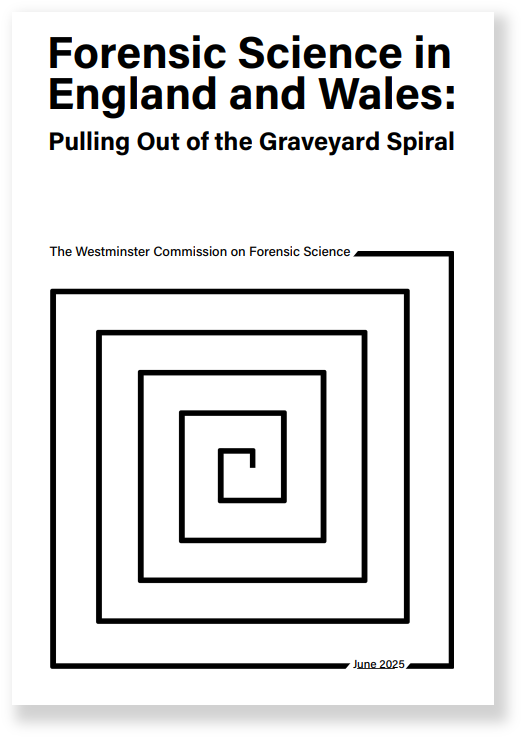The Westminster Commission on Forensic Science
A cross-post with Forensic Science(*) in England and Wales
Readers of Forensic Science* will know my undying admiration of Tiernan Coyle’s Substack, Forensic Science in England and Wales. Kudos1 to TC! His work has been a true archaeological/forensic deconstruction of what’s happened to forensic science* in England and Wales since the Forensic Science Service went on financial deathwatch. It’s a fascinating tale of politics, greed, ignorance, power, and a soupçon2 of science. If you haven’t read it, go now. I’ll wait.
Recently, The Westminster Commission on Forensic Science issued a report on forensic science* titled, Pulling Out of the Graveyard Spiral. With that on the front cover, I’m sure there’s a happy ending.3 More like schadenfreude.4 For U.S. readers, this is as close to the 2009 National Academies Report, Strengthening Forensic Science in the U.S.: A Path Forward as they’ll get across the pond, hopefully. From Tiernan’s TL, DR of his post on the report:
A UK parliamentary group's report warns that England and Wales' forensic science system is in a "graveyard spiral" due to a broken private market, police underfunding leading to corner-cutting, damaging over-reliance on police in-house labs, and loss of expertise. Key recommendations include an urgent national audit and halting police lab expansion to stabilize services; creating a fully independent National Forensic Science Institute (NFSI) to set strategy, protect niche disciplines, and fund research; long-term removal of ALL forensic services (including crime scenes and digital forensics) from police control for impartiality; reforming legal aid to ensure fair access to defence experts; and addressing systemic issues like lost evidence and inadequate defence funding that contribute to miscarriages of justice. The report argues comprehensive reform is critical to restore independence, capability, and public trust in the criminal justice system.
That hardly scratches the dreadful surface of their evaluation of the situation. Tiernan boils it down (as best one can with this kind of systemic issue addressed in a government report). As he notes,
Whether we are the pioneers of a new way of doing forensic science efficiently and effectively or have completely lost the plot and ended up turning the clock backwards is a matter of opinion, this report seeks to clarify precisely where we are and suggest a means to move forward. This post is all about looking at some of what their recommendations are and what the implications of accepting them could mean.
Go read, subscribe, and ponder. This really is a significant case study in government provision of services: Public or private? Is it like water, turn the tap freely for anyone? Or is it like U.S. healthcare, where you only be as healthy as you can afford? Should you argue with the fire fighting company that shows up to your burning house because you don’t belong to their group?5 Or is everyone’s house equally protected?
…ironically privatization does not shrink government—the broader goal of many of its own champions…there is more to consider in providing public services than trying to achieve efficiency; there are issues of equity and access that cannot be ignored.
I mentioned schadenfreude earlier. We read these reports, utter tut-tuts, whistle a little too loudly past the graveyard and say, “Well, thank goodness that’s not my lab.” It will be, eventually. As a colleague said to me, “These are reforms we’ve [globally] been asking, going back to 1995!” And what have we learned? That we are subservient to politics and have little power to change our fate.6
From Greek kydos meaning "glory, fame," originally university slang (1799).
“a slight trace or suggestion,” 1766 (Walpole), from French soupçon “a suspicion.”
Spoiler alert: There isn’t.
German, “pleasure derived by someone from another person's misfortune.”
In historical contexts, firefighting companies, often privately owned, were established to protect properties, including those of wealthy individuals and businesses, by charging for fire protection services. These companies provided fire suppression services, preventative measures, and even hired dedicated crews to protect specific properties during fires. This practice was especially prevalent in the mid-1800s, with private insurance companies forming their own fire units. In fact, it’s still a thing.
Sorry, this kind of thing leaves me in a foul mood. Here, go cheer yourself up.





